The Poetics of Rebellion: The Atenco Case
by Tiosha Bojórquez Chapela
I just feel music is powerful, man. Art is powerful. It’s more powerful than legislation and what you vote for and all that shit. And some people go like: “Yo, music is just entertainment, man.” Fuck that, Black people have never created anything that was two dimensional. There wouldn’t have been a Civil Rights movement, if “We Shall Overcome” hadn’t been written. Those things go hand in hand. The people need the songs to sing, to motivate them towards their outcome. And that’s what I write towards, supplying the songs to sing to motivate us towards that outcome”
Saul Williams 1
Mexico is a country that can be accused of almost everything but being boring. It is an historical fact that has been proved during the last two centuries: we always rush to enroll to the great liberation and revolutionary waves and, in more recent times, globaliphobic, altermundistas, or whatever name chosen to designate them. We are not so much interested with the theory of the revolution, but rather with its praxis, its making, its poiesis.
And, even if, unfortunately, in later years, we’ve been the thermometer that the gringos stick in the ass of Latin America, it’s clear that inside the thermometer the mercury is rising. The following images are a good indicator of the weather report in Mexico:
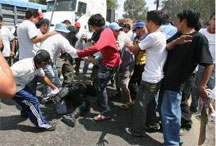
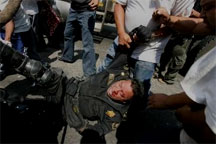
Photos from San Salvador Rebellion, May 4th, 2006. Published in: arizona.indymedia.org/news/2006/05/42302.php
May 4th of 2006. I arrive at my house late at night and turn on the TV: Revolt in Atenco. The screen shows repetitions of the image of a policeman laying unconscious on the floor as people kick him. The newscaster speaks indignantly of the brutality of the mob. Millions watch to the point of exhaustion as a man of the people, with a baseball cap, a full mustache and a generous belly is kicking the balls of another man of the people, this one dressed in a uniform, who is fallen and not reacting because he’s unconscious.
The mediatic poetics of neoliberalism enters the picture—an aerial shot from a helicopter erasing all memory and possible context, collapsing the reasons which made that surgically-prepared image possible.
Everything started years ago, with Fox’s project of a new airport as an alternate to that in Mexico City. This airport was to be built on the Texcoco Lake, in the neighboring Estado de Mexico; and it would be a monument to globalized modernity, entrenched in one of the poorest areas of the central portion of Mexico. The protests did not wait to show up. From ecologist activists concerned for the ducks in the lake, which, apparently were to die dismembered by the airplane’s propellers, to the mass demonstrations–famous for the machetes of the inhabitants of San Salvador Atenco–whom we saw that night, portrayed on TV, over and over, to exhaustion, as an infuriated horde.
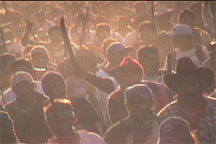
Unknown photographer
No one recalls that in exchange for the land the federal government offered the equivalent of forty-five cents of a dollar per square meter: less than a half of a dollar in exchange for a square meter of earth, history and roots. Three years ago, a popular mobilization halted the Foxist airport, with all its franchises and hotels (where the original inhabitants should be content with working as attendants). In almost every sense this was a great anti-hegemonic triumph.
A symbolic capital was also sown for the media which years later in the Atenco Revolt of 2006 turned invaluable for the hegemonicists: images of men, woman, elderly and even children brandishing machetes, sharpening them on the pavement, confronting the police and coming out victorious.
Incapable of accepting the triumph of others, Power comes back years later, through its mediatic poiesis, to remind us to whom the audiovisual archives of history belong. As Gil Scott-Heron said, “The revolution will not be televised”—until we break the hegemony over the means of communication. To do this must be central in our action. The mission of the poiesis of rebellion lies in securing the images of our triumphs as enduring icons of resistance, instead of allowing them to become instruments of ideological propaganda in the hands of the media.

In reality, as the big radio and Television conglomerates move towards renovation and search for new forms to manufacture their truth, in the independent media we still listen to–with 50 watts of power–the protest songs from the seventies: Venceremos, Adesalambrar, and Vientos del pueblo. It is almost twenty years since the fall of the Berlin Wall, and it appears clear that revolution requires new communicators and new proposals. Who wants to be Marx for the new Millennium…or at least the new Victor Jara 2? Who is willing raise their hands without fear that they may be crushed? That’s what happens to the Victor Jaras of this world. The poiesis of the rebellion, today as yesterday, requires courage and dedication.
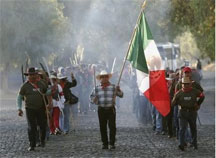
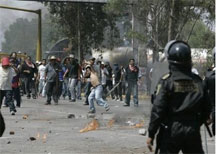
The poetics of the revolution enters the scene, snaggle-toothed and with hope in her eyes. In the streets, the people clashes with bottle-rockets, molotov cocktails, rocks and sticks against the Robocops of the Federal Preventive Police, who are armed with the latest in antiriot technology. And, as the mainstream radio and TV stations show us the violence erupting in the Mexico Profundo [Deep Mexico], the free media (Radio Zapote, KeHuelga Radio, Radio Pacheco, Centro de Medios Libres, Narco News, IndyMedia) showed us that the violence was really coming from the authorities: two dead, more than two hundred arrested, and one third of the woman detained, victims of sexual violence and rape inflicted by the police.
While listening to one of these stations, the list of missing people bears the name of a friend, Valentina Palma, filmmaker and anthropologist, with whom I studied at the university, and to whom I’ve been connected for years. It’s curious how the dimension of a piece of news changes when you know someone involved in it. From that moment on, the Atenco revolt seizes flesh, name and face.
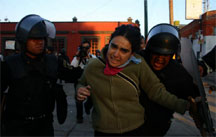
In the wee hours of the next day, we were posted at the migratory station with a group of friends. By the late afternoon, two official cars hastily drive away with Valentina and all the foreigners arrested in relation to the Case Atenco. A few hours later Valentina was on a flight bound to Chile. It didn’t matter that we had arrived to the airport on time with an appeal of habeas corpus obtained early that day: this deportation was illegal.
Valentina exits the scene, handcuffed to the wrist of a bureaucrat working late hours on a non-stop flight to Santiago; and, once again, the mass media poetics enters marching, with drums and cymbals: “ There were some police abuses, yes, but nothing close to what some have said.” Thus say not only the news, but even sitcoms and soap operas, in which screenwriters manage to make one or another veiled reference to the problem. “The police were forced into action and it did so in a surgical manner.”
Why do authorities like medical metaphors so much? In contrast, let’s look at following testimony, from Valeria Tellez Venegas, housewife and eighteen-year-old mother, who had the bad fortune of be passing by when the police operation was taking place.
They began by beating me and asking my address, age, name (…) One of them started to touch my face and he would stick his fingers on my mouth and in my vagina then forcing me to perform oral sex on him. He hurled his sperm in my white sweeter and another policeman came, and the same, he grabbed my breasts and said: “You are hot and you are breastfeeding, aren’t you? You slut-bitch” (…) Then came a third one, and told me that if I wanted his help I had to be his slut for a year, and go to live anywhere he wanted 3.
Well, perhaps not everything was that surgical after all. This testimony is not from a dialog in a gangster movie, but took place inside a police van after the Atenco Revolt, as the prisoners were transported to jail in a forty minute trip that, for some reason, lasted more than four nightmarish hours. These are the poetics of Power, in their most raw and unmistakable form.
Meanwhile, on the television and radio, the newscasters ridicule testimonies of abuse and rape as unfounded conspiracy theories. And perhaps, if I had not seen a picture of my friend Valentina, with her body covered in bruises, with her tits and ass pulverized by punches and even bites, and if she had not told me what she saw and heard, it would be easy to believe the TV and to think that these are testimonies manufactured to discredit the actions of the police. But no, these testimonies are true and the reality is dreadful. Everyday you hear other things, testimonies that are not reflected in the media and when you add all, you come to think that we live in a Narcostate, where people are tortured and disappeared on daily basis. If we manage to portray (again the poiesis) the true degree of barbarism of the State, perhaps people would grasp the imperative necessity for change.
After six years of Foxism in Mexico, we’ve become accustomed to living in two radically distinct countries at the same time. On the one hand, there is a virtual Mexico featured by the producers of Televisa and TVAzteca, a Mexico that advances towards development, that leaves the stigmas of the Third World behind and perfects its democratic institutions; and, on the other, the Mexico of the vast majorities that are dying of hunger and would explode if it was not for immigration. This is a Mexico with a geography full of ghost towns, inhabited by elderly, woman, children…and stray dogs, many stray dogs. More than five million people have left the country in only the last six years. Immigrants never take their dogs with them.
But…I think I’m digressing.
***
“We are making history”, I’m told by Rodrigo Solis, the new promise in the Mexica urban poetry, as he lights a cigarette and nervously turns in all directions. We’re convinced that the intelligence services are following us. “ You are burning your beard,” I tell him. I’m riding a car with Rodrigo and another vato, of whom I would like to remember his name but I cannot, and who also does this thing of the plaza poetry, urban and aloud, that in other latitudes is known as spoken word and that is heir here to the urban rock-and-roll troubadours from past decades: Jaime López, Rodrigo González et al.
I’m also a spokenwordero. And, more importantly, I have an old small car with a good engine that has made me very popular lately. The day before yesterday, I drove to the National Indigenous Congress two of the Huichol delegates that were present during the repression in Atenco and were escaping a Dantesque episode. Yesterday I was involved in a movie-like chase, full speed on the freeway, on the tails of an immigration patrol that was transporting a German girl to an unknown destination. We were concerned she might be disappeared. Today, the vast majority of the people detained in Atenco are locked-up in Santiaguito. So I’m driving with Solis and this other vato that I wish I could remember the name of, but cannot; and we’re heading towards the Santiaguito Penitentiary, in the outskirts of Toluca, almost three thousand meters above sea level.
Rodrigo and me listen in disbelief as the vato with the unmemorable name asks us if is it dangerous that he is carrying a joint. “What do you mean you have a joint, you bastard? Don’t fuck with us!” we exclaim almost in a chorus. “We must smoke it before we get there, the pigs may stop us.” We’ve emptied our houses of any image that may seem subversive, spent nights without sleeping, days convinced we are being constantly followed and our phones are surveyed by the authorities. It is another very different thing to throw a good joint out the window—we roll up fast, seeds and all, and smoke it before we arrive in Toluca.
Listen to Ojos Rojos
“Of some years to now, we had won spaces to smoke”, reflects Rodrigo, “We smoked in demonstrations, we smoked during the university strike back in ‘99, we debated about the legalization of weed as part of the struggle. But now we have to be worried about more elemental things, like the release of the 254 motherfuckers that they have imprisoned!” In the distance, next to a very green hill and behind a huge buildings-project under construction stand two prototypical prison towers. They could be the towers in any cholo mural, tattoo, or inked headband.
Next to a small road there is a long line of parked cars, most of them carrying signs in solidarity with the incarcerated. Further ahead, close to the penitentiary entry and the encampment with its tents, under a bright pink plastic the stage area stands—a microphone and two powerful speakers. A long-haired compa with a pockmarked nose sings a classic: “Aquí se queda la clara, la entrañable transparencia, de tu querida presencia, comandante Ché Guevara”. There must be about a hundred people in between the ones staying in the tents and some, like us, who are itinerant, gathered at the door of the tribunal.
Inside the building, it is just another day at the office. In and out go the officials, families of the people incarcerated, and the people still being judged. But inside, the first people who were allowed to visit the political prisoners tell us that you can hear the sound system inside the jail, and that the compas get a morale boost knowing that there is support outside.
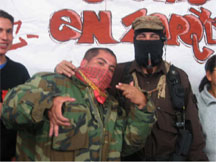
MC Loko and Sucomandante Marcos
As a result, when I get my turn on the microphone, I think about the fact that inside, amongst the ones caught in Atenco, is MC Loko, who made a rap for Marcos, and is representing the national hip-hop scene in the Zapatista circles. Inside, also, is Mariana Selvas, who was nursing the wounded besides her father, a doctor, when they were detained, and the dad is not even in this penitentiary, but in the one of high security La Palma, with kidnappers like the Mochaorejas. Well, perhaps Loko and Mariana would enjoy the hip-hop poetry that I perform.
Listen to Planeta Tierra
And after all, this is our “making”, our poiesis: a group of friends standing in front of the immigration station, so Valentina could see we where there; a hundred people gathered around two strong speakers in front of the walls of the jail, so the imprisoned know that outside there is people giving them their support. A fragile support, yes, but support nonetheless. And clearly the big media, radio and TV always reaches more people, but what we do reaches deeper.
Snaggle-toothed and tattered, the poetics of resistance pass from generation to generation, recycling its own imperfection, because in the end, if it ever became perfect, pristine, it would die. Ours is by definition, a poetics of the precarious, of minimum resources, illusion and utopia. Next to the walls of the prison of Santiaguito, tossing our poems to the wind, we are heirs to the troops that Joshua send to tumble down the walls of Jericho, only by marching and sounding their trumpets. We circle the walls and chant because this is our poetics.
Translator's notes:
‘Compa’s is short for ‘Compañero’s, which would be translated to companions but is actually the equivalent to brothers and sisters, or comrades.
The Mochaorejas is the infamous leader of a gang of kidnappers that would extortion ransoms by sending the ears of their captives to the families.
Footnotes
Interview with Saul Williams in: Street Credentials (2006), feature film directed by Tony Samuel and Israel Vasquetelle. Presented by Insomniac Inc. in conjuntion with Rescue One Productions. (back)
Víctor Jara (1932-1973) was a Chilean popular singer, of Mapuche descent, who was brutaly assesinated by the military police of Augusto Pinochet, during the early period of the military coup. The story says that soldierssmashed his hands with their rifles to prevent him from playing guitar ever again. (back)
Testimony broadcasted on Ke-Huelga radio station. (back)
